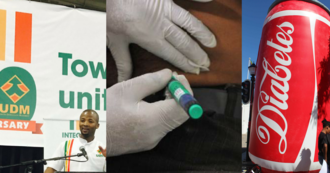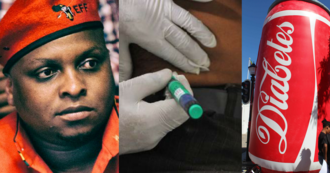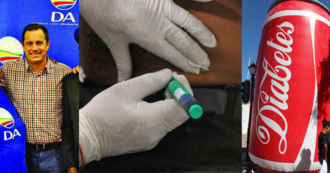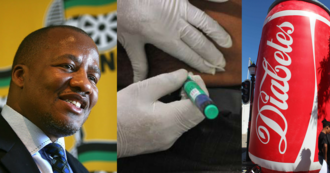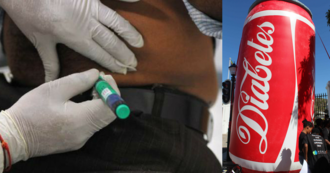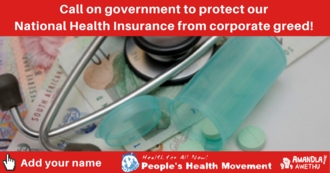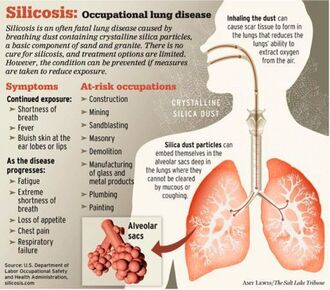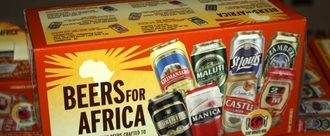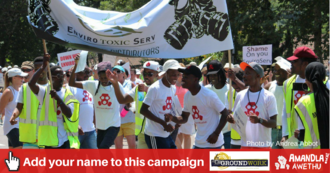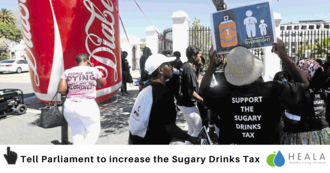- Featured
- Clean air
- Climate justice
- Consumer Rights
- Corporate Accountability
- Data access
- Early Childhood Development
- Economic fairness
- Education
- Electoral fairness
- Environmental justice
- Food justice
- Gender based violence
- Grants/social assistance
- Health
- Housing and infrastructure
- Industry interference
- Land Justice
- LGBTQIA+ rights
- Media/ information access
- Public transport
- Racism
- Reparations
- Safety
- Sanitation
- Service Delivery
- Sexual and Reproductive Rights
- Social justice
- Unemployment
- Womxn's rights/ gender equality
- Workers' rights
- More
-
UDM, vote yes for the Health Promotion Levy (sugary drinks tax)We know the beverage industry is desperately trying to delay and further water down the sugary drinks tax (Health Promotion Levy). BevSA and Coca-Cola’s job losses scaremongering has been exposed as exaggerated [1] and self serving [2]. A recent study showed that 3/4s of adult South Africans believe that government is doing the right thing when it makes and enforces policy to discourage the consumption of sugary beverages and junk foods [3]. We can’t underestimate how far the likes of Coca-Cola will go to protect their profits at the expense of our health. Leaked Coca-Cola executive emails show that the company has managed to get a “seat at the table in on-going regulatory discussions with the Ministry of Health” and has been fighting the tax [4]. BevSA and Coca-Cola also managed to keep health experts and advocates out of the NEDLAC process. Treasury seems to be standing up against companies like Coca-Cola and announced that the sugary drinks tax is likely to be introduced in April 2018. Treasury Deputy Director General Ismail Momoniat went one step further, acknowledging the criticism from the health sector regarding the watering down of the sugary drinks tax, stating that they would “... increase the tax until we get the result we need” [5]. South Africa can’t afford any further delays or the watering down of the sugary drinks tax. [1] Sugar tax: Job losses lower than industry’s projections. Amy Green for Health-e news June 2017 [2] SA’s proposed sugar tax: claims about calories & job losses checked. Kate Wilkinson & Vinayak Bhardwaj for Africa Check August 2016 [3] 70% of South Africans support sugar tax - Genesis study August 31, 2017 http://www.genesis-analytics.com/news/2017/70-of-sa-suppports-sugar-tax-genesis-study [4] New #CokeLeak: Soda Tax Opposition in 8 More Countries. https://medium.com/cokeleak/new-cokeleak-soda-tax-opposition-in-8-more-countries-a53e2df3d8e4 [5] Sugary drinks tax set for April next year. Kerry Cullinan for Health-E News September 201780 of 100 SignaturesCreated by amandla mobi member

-
EFF, vote yes for the Health Promotion Levy (sugary drinks tax)We know the beverage industry is desperately trying to delay and further water down the sugary drinks tax (Health Promotion Levy). BevSA and Coca-Cola’s job losses scaremongering has been exposed as exaggerated [1] and self serving [2]. A recent study showed that 3/4s of adult South Africans believe that government is doing the right thing when it makes and enforces policy to discourage the consumption of sugary beverages and junk foods [3]. We can’t underestimate how far the likes of Coca-Cola will go to protect their profits at the expense of our health. Leaked Coca-Cola executive emails show that the company has managed to get a “seat at the table in on-going regulatory discussions with the Ministry of Health” and has been fighting the tax [4]. BevSA and Coca-Cola also managed to keep health experts and advocates out of the NEDLAC process. Treasury seems to be standing up against companies like Coca-Cola and announced that the sugary drinks tax is likely to be introduced in April 2018. Treasury Deputy Director General Ismail Momoniat went one step further, acknowledging the criticism from the health sector regarding the watering down of the sugary drinks tax, stating that they would “... increase the tax until we get the result we need” [5]. South Africa can’t afford any further delays or the watering down of the sugary drinks tax. [1] Sugar tax: Job losses lower than industry’s projections. Amy Green for Health-e news June 2017 [2] SA’s proposed sugar tax: claims about calories & job losses checked. Kate Wilkinson & Vinayak Bhardwaj for Africa Check August 2016 [3] 70% of South Africans support sugar tax - Genesis study August 31, 2017 http://www.genesis-analytics.com/news/2017/70-of-sa-suppports-sugar-tax-genesis-study [4] New #CokeLeak: Soda Tax Opposition in 8 More Countries. https://medium.com/cokeleak/new-cokeleak-soda-tax-opposition-in-8-more-countries-a53e2df3d8e4 [5] Sugary drinks tax set for April next year. Kerry Cullinan for Health-E News September 2017107 of 200 SignaturesCreated by amandla mobi member

-
DA, vote yes for the Health Promotion Levy (sugary drinks tax)We know the beverage industry is desperately trying to delay and further water down the sugary drinks tax (Health Promotion Levy). BevSA and Coca-Cola’s job losses scaremongering has been exposed as exaggerated [1] and self serving [2]. A recent study showed that 3/4s of adult South Africans believe that government is doing the right thing when it makes and enforces policy to discourage the consumption of sugary beverages and junk foods [3]. We can’t underestimate how far the likes of Coca-Cola will go to protect their profits at the expense of our health. Leaked Coca-Cola executive emails show that the company has managed to get a “seat at the table in on-going regulatory discussions with the Ministry of Health” and has been fighting the tax [4]. BevSA and Coca-Cola also managed to keep health experts and advocates out of the NEDLAC process. Treasury seems to be standing up against companies like Coca-Cola and announced that the sugary drinks tax is likely to be introduced in April 2018. Treasury Deputy Director General Ismail Momoniat went one step further, acknowledging the criticism from the health sector regarding the watering down of the sugary drinks tax, stating that they would “... increase the tax until we get the result we need” [5]. South Africa can’t afford any further delays or the watering down of the sugary drinks tax. [1] Sugar tax: Job losses lower than industry’s projections. Amy Green for Health-e news June 2017 [2] SA’s proposed sugar tax: claims about calories & job losses checked. Kate Wilkinson & Vinayak Bhardwaj for Africa Check August 2016 [3] 70% of South Africans support sugar tax - Genesis study August 31, 2017 http://www.genesis-analytics.com/news/2017/70-of-sa-suppports-sugar-tax-genesis-study [4] New #CokeLeak: Soda Tax Opposition in 8 More Countries. https://medium.com/cokeleak/new-cokeleak-soda-tax-opposition-in-8-more-countries-a53e2df3d8e4 [5] Sugary drinks tax set for April next year. Kerry Cullinan for Health-E News September 2017257 of 300 SignaturesCreated by amandla mobi member

-
ANC, vote yes for the Health Promotion Levy (sugary drinks tax)We know the beverage industry is desperately trying to delay and further water down the sugary drinks tax (Health Promotion Levy). BevSA and Coca-Cola’s job losses scaremongering has been exposed as exaggerated [1] and self serving [2]. A recent study showed that 3/4s of adult South Africans believe that government is doing the right thing when it makes and enforces policy to discourage the consumption of sugary beverages and junk foods [3]. We can’t underestimate how far the likes of Coca-Cola will go to protect their profits at the expense of our health. Leaked Coca-Cola executive emails show that the company has managed to get a “seat at the table in on-going regulatory discussions with the Ministry of Health” and has been fighting the tax [4]. BevSA and Coca-Cola also managed to keep health experts and advocates out of the NEDLAC process. Treasury seems to be standing up against companies like Coca-Cola and announced that the sugary drinks tax is likely to be introduced in April 2018. Treasury Deputy Director General Ismail Momoniat went one step further, acknowledging the criticism from the health sector regarding the watering down of the sugary drinks tax, stating that they would “... increase the tax until we get the result we need” [5]. South Africa can’t afford any further delays or the watering down of the sugary drinks tax. [1] Sugar tax: Job losses lower than industry’s projections. Amy Green for Health-e news June 2017 [2] SA’s proposed sugar tax: claims about calories & job losses checked. Kate Wilkinson & Vinayak Bhardwaj for Africa Check August 2016 [3] 70% of South Africans support sugar tax - Genesis study August 31, 2017 http://www.genesis-analytics.com/news/2017/70-of-sa-suppports-sugar-tax-genesis-study [4] New #CokeLeak: Soda Tax Opposition in 8 More Countries. https://medium.com/cokeleak/new-cokeleak-soda-tax-opposition-in-8-more-countries-a53e2df3d8e4 [5] Sugary drinks tax set for April next year. Kerry Cullinan for Health-E News September 2017516 of 600 SignaturesCreated by amandla mobi member

-
Treasury don’t back down! We need a strong sugary drinks tax nowWe know the beverage industry is desperately trying to delay and further water down the sugary drinks tax (health promotion levy). BevSA and Coca-Cola’s job losses scaremongering has been exposed as exaggerated [1] and self serving [2]. A recent study showed that 3/4s of adult South Africans believe that government is doing the right thing when it makes and enforces policy to discourage the consumption of sugary beverages and junk foods [3]. We can’t underestimate how far the likes of Coca-Cola will go to protect their profits at the expense of our health. Leaked Coca-Cola executive emails show that the company has managed to get a “seat at the table in on-going regulatory discussions with the Ministry of Health” and has been fighting the tax [4]. BevSA and Coca-Cola managed to keep health experts and advocates out of the NEDLAC process. Treasury seems to be standing up against companies like Coca-Cola and announced that the sugary drinks tax is likely to be introduced in April 2018. Treasury Deputy Director General Ismail Momoniat went one step further, acknowledging the criticism from the health sector regarding the watering down of the sugary drinks tax, stating that they would “... increase the tax until we get the result we need” [5]. South Africa can’t afford any further delays or the watering down of the sugary drinks tax. With 10,000 new diabetes cases reported to clinics each month [6], we need to act now. [1] Sugar tax: Job losses lower than industry’s projections. Amy Green for Health-e news June 2017 [2] SA’s proposed sugar tax: claims about calories & job losses checked. Kate Wilkinson & Vinayak Bhardwaj for Africa Check August 2016 [3] 70% of South Africans support sugar tax - Genesis study August 31, 2017 http://www.genesis-analytics.com/news/2017/70-of-sa-suppports-sugar-tax-genesis-study [4] New #CokeLeak: Soda Tax Opposition in 8 More Countries. https://medium.com/cokeleak/new-cokeleak-soda-tax-opposition-in-8-more-countries-a53e2df3d8e4 [5] Sugary drinks tax set for April next year. Kerry Cullinan for Health-E News September 2017 [6] Diabetes – the silent killer. Amy Green for Health-E News. August 2017216 of 300 SignaturesCreated by HEALA .

-
Defending a People’s National Health Insurance – quality health for all, not private profitThe SA National Department of Health (NDOH) is establishing the National Health Insurance (NHI) to achieve universal access to quality health care for all who live in South Africa. We welcome the commitment from the NDOH to a NHI based on principles of equity, health as a right and redress of past inequalities. The White Paper on the NHI makes it clear a ‘Single Payer’ system is the best way to achieve this. The recent NDoH documents have jettisoned these principles of equity and human rights in how it has set up Task Teams, Advisory Committees and Working Groups to ‘implement’ the NHI. The Terms of Reference for these structure now introduce protections for the medical schemes and private sector actors that are not present in the White Paper. If implemented, they will exacerbate inequality in the health sector. Also, the composition of the Committees prescribed in the Government Gazette is dominated by the private sector and other special interest groups – with almost no participation by civil society, which is present on only one of the 7 structures. Instead, we see committees loaded with representatives of Medical Schemes, Actuarial Society, Private hospital groups, Health professional societies, Academic and research organisations. Almost all of these groups have a vested interest in keeping the health system largely the way it is and many of them are directly responsible for the fundamental health system inequalities that the NHI is meant to address. This is elite decision-making at the expense of ordinary South Africans – it isn’t democratic or logical to reserve decision-making for those who stand to benefit directly while keeping ordinary South Africans in the dark. It is crucial we keep the ‘Single Payer’ principle so that all people (employed, unemployed, civil servants and all) are treated equitably in paying into and receiving benefits from the NHI. We reject an unequal and fragmented system, which is against the progressive principles of previous planning documents for the NHI. Has the private sector and vested interests captured the NHI through secret lobbying? We reject a NHI driven by technocrats and people with direct conflict of interest in designing the implementation of the NHI. We will not accept our public health system, with all its faults, being sold off to private interests so they can secure an NHI favourable to their profits. South Africa belongs to all who live in it – all South Africans have equal status and rights to influence decisions that will affect them and their children for generations. We say no to corporate capture of the NHI. We want an accountable NHI and an accountable Health Ministry that does not say one thing in a White Paper and do the opposite behind closed doors. We will not stand back and allow this shameful co-option of the NHI by a powerful elite. We call on all individuals and Civil Society organisations to insist that our leaders and the Department of Health officials are accountable and keep to the policies they have said they would advance. Forward to a People’s NHI, forward!474 of 500 SignaturesCreated by People's Health Movement

-
Deliver fair compensation for miners with silicosisZwelakhe Dala passed away on 30 March 2015. His death certificate just states that he died of natural causes. He was 55 years old and was suffering from silicosis. Zwelakhe’s widow, Nosipho, is but one of hundreds of thousands of families who stand to benefit from the class action lawsuit brought against the likes of Anglo American, Gold Fields, AngloGold Ashanti, African Rainbow Minerals, Sibanye Gold and Harmony Gold. Zwelakhe is one of thousands of workers suffering from silicosis-related diseases. In May last year, the South Gauteng High Court ruled in favour of mine workers who intend on launching a silicosis class action. The case was granted a class action certification which will make it the largest class action ever to be certified in South Africa, allowing hundreds of thousands of gold miners and their families to seek redress against gold mining companies. Below is a summary of the facts pertaining to the settlement plan: Last year, the gold mining companies launched an appeal against the court decision to allow miners suffering from silicosis and TB to fight for compensation as a group. The High Court ruled on June 24, 2016, to allow workers and families who’ve been affected by Silicosis and TB to file a class action suit against gold companies. The biggest gold producers – African Rainbow Minerals, Anglo American SA, AngloGold Ashanti, Gold Fields, Harmony, and Sibanye – are trying to negotiate a settlement, involving the departments of Health and Mineral Resources and the mine workers’ representatives. This would involve setting up a trust fund to pay “top-ups” to workers who have already been paid compensation. It would also involve bringing mine workers under the Compensation for Occupational Injuries and Diseases Act (COIDA) and the Department of Labour, instead of the Occupational Diseases in Mines and Works Act (ODIMWA) and the Department of Health. This would prevent any future civil claims by mineworkers for damages for employer negligence causing silicosis and TB. The mining companies’ choice to use appeals to delay any trial on the merits of the case for as long as possible while they manage a negotiation process away from judicial oversight is an underhanded move aimed at undermining its role, and shortchanging the claimants and their families. We have seen evidence of this in earlier settlements where 4 365 workers were paid a maximum of R464 million [1] by Anglo mines. When this figure is divided amongst the number of workers claiming it averages to a measly R106 300 per claimant. There is also a real possibility that not all claimants will be paid based on tests of a random sample. Just recently, Anglo American announced a $101m (R1.3bn) “best estimate” for settling its liability in the now 13-year-old legal battle to compensate mine workers suffering from lung diseases [2]. This also coincided with Gold Fields announcing its provision for a settlement amounting to $30.2m. We need to ensure that other gold mining companies implicated stop the delay tactics and pay mine workers compensation. [1] Silicosis claims: Anglo has to cough up nearly R500m, Dewald van Rensburg for News24. 6 March 2016. [2] Mines make room for silicosis settlements, Dewald van rensburg for News24. 30 July 2017.23 of 100 SignaturesCreated by Amandla.mobi Member
-
Dangerous Animals on our streetsThere's a group of boys going around our streets in Atteridgeville with pitbulls in chains. These boys need to be stopped ASAP. Just last week a child was brutally bitten by one of their dogs. Though I'm not sure if the incident is tied to these boys but I highly suspect it's them. A few months back they were seen in Ramushu street setting their dogs to fight one of the neighborhood's small dogs. The dog annihilated the small dog and the puppy died on the spot with bloody guts all over the place. The boys ran off after the incident. The Animal Matters Amendment Act, 1993 (Act 42 of 1993) among others, provides that a court may make certain directions in respect of injuries caused by animals. Any person as a result of whose negligence an animal causes injury to another person, shall be guilty of an offence and liable on conviction to a fine or to imprisonment for a period not exceeding two years. A court convicting a person may make an order regarding the removal, custody, disposal or destruction of the relevant animal and the recovery of any costs incurred. As stated above, the owner of the dog is liable for compensating the victim for medical expenses, wage losses, pain and trauma suffered due to the injury. Medical expenses may include, but are not limited to: emergency medicine, plastic surgery, orthopedic surgery, hospital stay, antibiotics, X-Rays, CAT scans, physiotherapy and psychotherapy. South African laws states that dogs must be leashed unless confined in its home. If the dog was off the leash at the time of the attack, or was not compliant with the laws, the owner may be required to pay a higher penalty. Someone needs to stop these boys. They think they're in a rap video or something and putting our little brothers\sisters\sons\daughters in danger because once that dog grabs a small person, it doesn't let go till the person stops moving. This is something owners often train dogs to do. We need to create awareness about this and stop these boys ASAP. If you stay around Atteridgeville please share this and get the word out. It could be your family member that falls victim to their beasts.35 of 100 SignaturesCreated by Lesley Bopape
-
STOP THE MARKETING OF ALCOHOL IN THE NAME OF HUNGER IN AFRICASouth African Breweries recently launched a ‘Beers for Africa 8‐pack’ campaign to raise money in support of an NGO called Stop Hunger Now SA. They claim that the money will be used to help food‐challenged students. Helping the students is a welcome initiative. However, the way they are raising the money is a problem. SAB/AB InBev are encouraging people to buy their 8‐packs, which contain beers from six different Southern African countries, with the message that: "the more beer you buy, the more money we give to hungry students". This marketing campaign is first and foremost in the commercial interests of SA Breweries (AB InBev) and should not be supported. It is unethical to make a link between buying alcohol and feeding children. It also promotes an existing problem by encouraging people to drink more when we already have a drinking problems in the Southern African region. Help us – the Southern African Alcohol Policy Alliance (SAAPA) – to stop SAB/AB Inbev from using poverty and hunger to promote their ‘Beers for Africa 8‐pack’ sales.23 of 100 SignaturesCreated by Southern African Alcohol Policy Alliance in SA (SAAPA SA)

-
Pay Nurses in Western Cape the 'Danger Allowance'If Parliament can pay its security personnel, popularly known as 'bouncers', can be paid danger allowance [1] then nurses working psychiatric patients and other public servants can be paid the same. If the government paid its employees well then maybe the attitudes of those employees would drastically change when they deal with members of the public. Presently, in the ongoing strike by mortuary workers, danger pay has once again been one of the demands made [2]. Danger pay was first introduced during the 1999 wage negotiations for state employees such as traffic inspectors, prison warders and social workers. [1] EFF rejects danger pay for Parliamentary bouncers, Mxolisi Mngadi for News24. 7 May 2017. [2] Agreement to end mortuary strike on the cards, eNCA. 21 June 2017.1,967 of 2,000 SignaturesCreated by Amandla.mobi Member
-
Revoke Enviroserv Shongweni Landfill LicenceEnviroserv has been in the news a lot lately for their toxic waste landfill site, which has angered the residents of Shongweni. But Enviroserv’s crimes are not only limited to those in the current new cycle. They have been polluting in black communities, such as Ntshongweni, Dassenhoek, KwaNdengezi, Buxfarm and Cliffdale, for over 15 years and have left struggling communities with a mountain of health issues including; headaches, fatigue and nose bleeds. There is has been no science-specific research that measures the long term impacts of Enviroserv’s pollution and the health issues experienced by communities. A targeted surveillance system that maps out the social, health and environmental impacts created by hazardous waste needs to be developed to avoid far more serious health issues like cancer in the future. Enviroserv’s legal appeal process that is challenging DEA’s decision to suspend their operations license, sends a clear message that Enviroserv thinks our lives are cheap and that profit matters more to them then our health, environment and quality of life. EnviroServ is ignoring our constitutional rights and the increased incidence of illnesses apparently related to the foul odour, not to mention the psychological effects living in the stench of a toxic landfill is having on us. By refusing to tell us what is going into the landfill and what its possible toxic effects on humans are, you are only serving to increase our fear that the health effects are being caused by the hazardous, ineffectively or untreated waste being accepted at the landfill.30 of 100 SignaturesCreated by Amandla.mobi Member
-
Send Parliament a message that you support a strong sugary drinks taxOur nation’s health is in crisis and Sugary drinks are one of the most significant contributors to diabetes, obesity, heart disease, liver and kidney damage, and some cancers that are on the rise globally and in South Africa. The South African Parliament is currently considering a sugary drinks tax, that is a critical first step to reducing sugary drinks consumption and curbing obesity and related diseases. But greedy beverage companies have been lobbying Parliament to water down the sugary drinks tax. That’s why Parliament MUST hear from YOU to make sure the final policy is strong and effective in reducing consumption of harmful sugary drinks. Tackling obesity-related diseases needs to be a national priority, and the proposed tax on sugary drinks is a first step in addressing this national epidemic. South Africa is already ranked the most obese country in sub-Saharan Africa. Excess sugar consumption is a major cause of obesity and its related diseases, as excessive sugar intake causes increased risk of diabetes, liver and kidney damage, heart disease, and some cancers. The World Health Organisation (WHO) and the World Cancer Research Fund recommend that people should consume no more than 10% of total calories from sugar. The South African government has been under pressure from beverage companies and retail groups who have been flooding Parliament and Treasury with comments to stop this live-saving policy or weaken it with exemptions and loopholes—and they are having an impact. The South African government MUST put the health of South Africans before special interests who target the most vulnerable populations with their unhealthy products. Please make your voice heard today!2,951 of 3,000 SignaturesCreated by HEALA .

.png)
